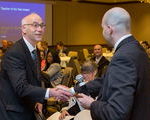Teacher of the Year award for Douglas Husmann, M.D. — a voice, chirping in the ears of former trainees
Douglas Husmann, M.D. (U ’91), Department of Urology and the Anson L. Clark Professor in Urology, didn’t train at Mayo Clinic but has influenced many Mayo medical students, residents and fellows. In 2018 he received his eighth Teacher of the Year award, reaffirming him in the Mayo Fellows’ Association Hall of Fame.
 Dr. Husmann says the legacy a person leaves behind is the people they touched in their lifetime. In his case as a teacher, that’s the knowledge he’s imparted to the physicians he’s trained and the patients they’ve helped.
Dr. Husmann says the legacy a person leaves behind is the people they touched in their lifetime. In his case as a teacher, that’s the knowledge he’s imparted to the physicians he’s trained and the patients they’ve helped.
“I tell my trainees that when they leave Mayo Clinic, I want them to hear my voice in the background, chirping at them about how they handle themselves in the operating room and how they treat patients — like a conscience sitting on their shoulder.”
Dr. Husmann doesn’t display diplomas on the walls of his office. But he does display teaching awards because, he says, that’s what’s important to him.
Who were your teaching role models?
Dr. Hal McDonald in plastic surgery at the Presidio in San Francisco and Dr. Bernie Churchill at the Hospital for Sick Children in Toronto had awesome technical surgical skills and were masters at teaching their skills to their trainees. Gordon McLorie (deceased) at the Hospital for Sick Children in Toronto exemplified how to be professional, kind and considerate to your peers but also skilled in getting your point across. Dr. Paul Peters (deceased) was the best didactic and most caring teacher teacher I have ever seen or experienced in my life. And Dr. Terry Allen at the University of Texas Southwestern Medical Center taught me to love pediatric urology and reconstruction. He possessed a wealth of knowledge far beyond the scope of his field. He was always both the educator and the student, seeking to teach but also to gain your knowledge.
What’s your teaching style?
I use a Socratic method — ask trainees questions until they don’t know the answers. Then teach them what they don’t know. My style is a mixture of all of my role models. I try to emulate the best of what they taught to me.
What’s rewarding about teaching?
I enjoy helping individuals along so they can apply what they learned in medical school in a clinical arena, understand how to be better physicians and surgeons, thereby taking better care of patients.
Teaching is like raising children. You try to raise them right and set them up to go off and be successful on their own. You see them mature before your eyes.
How do you know when you’ve done a good job teaching?
You know you’ve done a good job when you see residents do the right thing for patients, perform well in the operating room, and treat patients, colleagues and ancillary health staff with empathy and respect.
Have students changed through the years?
Yes. They’re still very interested in learning, but learning and its impact on their lifestyle have changed.
When I trained, we lived, ate and drank medicine and were at the hospital all the time. That environment was tough on people. Divorce was rampant. Burnout was a standard to be expected in a physician’s life. Balance was not a word that was tolerated; I was taught medicine is a jealous mistress that will always control your life. Today we help create a more balanced individual with the opportunity for a better lifestyle. Although there is still burnout, we are more aware of its presence and learning how we may better deal with the demands faced by physicians and surgeons.
What does the Teacher of the Year award mean to you?
It’s a very humbling honor. When you teach, you realize it’s a team effort. What makes a good residency is multiple teachers who each leave something with the student. Some teachers reach students in a different way than I can. That’s fine; not all of us learn in the same pattern. All teachers want the same outcome — an excellent physician who exemplifies care, compassion and professionalism to their patients and colleagues.
It is similar to seeing your child succeed, you don’t care whether they learned certain things from you, your spouse or a friend. You just want them to succeed. The end product is what matters.
Student comments
“Dr. Husmann exemplifies the surgeon-teacher: approachable, affable, available. Always.”
“Dr. Husmann consistently prioritizes teaching during his busy clinical schedule. He is one of the most caring, patient, knowledgeable and thoughtful teachers I’ve had the pleasure of working with during my lifetime of learning.”
“Everything he says is gold!”